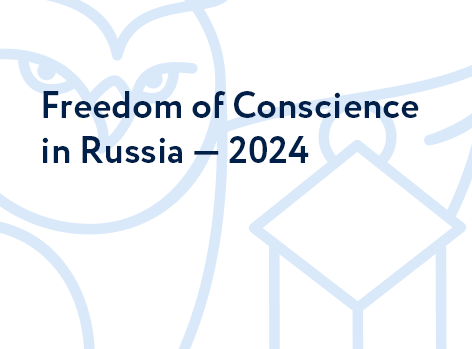SOVA Research Center took part in the 2025 OSCE Warsaw Human Dimension Conference (October 6 - 17). Here we publish our statement at the Plenary Session "Fundamental freedoms II" on October 16.
Dear moderator, dear participants!
I would like to draw your attention to several issues concerning freedom of religion or belief in Russia today.
1. The list of religious organizations declared 'undesirable' in Russia kept growing. Last year, Brigham Young University, founded by the Church of Jesus Christ of Latter-day Saints, and the charitable foundation “Peace unto All” (“Friede Allen e.V.”), which provides help for anti-war Russian Orthodox clergy priests, were added to this list.
Followers of organizations already on the list were subjected to administrative and criminal prosecution more often. We are seeing new cases being initiated. Criminal sentences have been passed, including actual prison terms. For example, in Moscow, a court sentenced Mikhail Koval, Ilona Nagornova, and Nadezhda Ukhova to three to four years in prison for cooperation with the All-Ukrainian Spiritual Center Renaissance and its charitable arm.
2. More religious figures, both clergy and laity, were declared “foreign agents.” At the beginning of October, the list included nine priests alone. Most of them had already been forced to leave Russia by the time they were added to the list.
3. The tightening of migration policy has resulted in increased pressure on Muslim communities. Law enforcement agencies have been increasingly conducting raids to identify illegal migrants. These raids were often involving right-wing extremist organizations to participate. These raids often disrupt religious services. Muslim prayer houses in various regions are being closed or suspended. This is happening especially often in Moscow and the Moscow region, which had been experiencing a shortage of mosques even before. Supported by a mass media campaign, these actions project an image of Muslims as enemies and contribute to the growth of xenophobic sentiment: this year, we are observing an increase in vandalism against Muslim sites.
4. The unlawful persecution of religious organizations deemed 'extremist' continues. Jehovah's Witnesses face the most severe persecution among these groups, with many members receiving real prison sentences merely for practicing their faith. As of early October 2025, 160 believers were incarcerated in penal colonies and pre-trial detention centers. Representatives of other religious organizations and movements are also persecuted, albeit on a smaller scale.
Our recommendations for OSCE Member States
1. To abandon the practice of recognizing organizations as extremist and banning organizations on the basis of their doctrine as such, including the assertion of the superiority of their religion over others. And, accordingly, abandon the practice of prosecuting followers of the relevant religious movements for religious meetings and joint prayers as participation in banned organizations. (In Russia, this applies, for example, to Jehovah's Witnesses, followers of Said Nursi (banned as the Nurcular organization), Tablighi Jamaat, and Alla Ayat).
2. To abandon bans on books and other religious materials on similar grounds. It is even better not to use the mechanism of creating a list of banned books and other materials at all.
3. To abandon the use of the concepts of "undesirable organization," "foreign agent," and similar defamatory labels that are not based on clear legal criteria, including in relation to religious associations.
4. Show respect for places of worship when conducting police operations. Avoid shutting down places of worship without proof of criminal activity by its clergy or administration.


